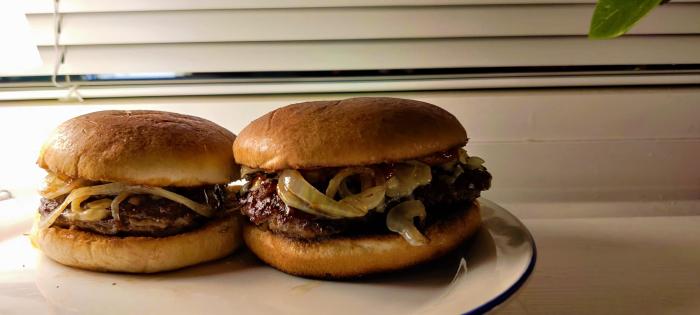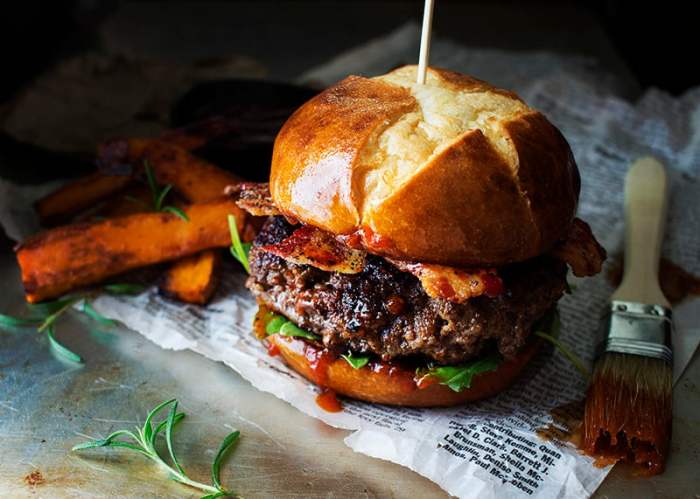BBQ Sauce Recipe for Burgers
BBQ Sauce for Burgers: A Flavorful Journey: Bbq Sauce Recipe For Burgers
Bbq sauce recipe for burgers – BBQ sauce, a staple in American cuisine, has evolved far beyond its humble beginnings. Initially used primarily as a marinade or basting sauce for meats, its rich and versatile flavor profile has made it a beloved condiment for burgers, elevating the classic American dish to new heights. The versatility of BBQ sauce allows for endless culinary exploration, offering a spectrum of sweet, smoky, and spicy notes to complement the savory flavors of the beef patty.
This article delves into the world of BBQ sauce, exploring its history, key ingredients, recipe variations, cooking techniques, and ideal burger pairings.
Introduction to BBQ Sauce for Burgers
The history of BBQ sauce is a rich tapestry woven from diverse regional influences and culinary traditions. While pinpointing a precise origin is difficult, its evolution is deeply intertwined with the history of barbecuing itself. Initially, simple mixtures of vinegar, spices, and sometimes sweeteners were used to tenderize and flavor meats during long, slow cooking processes. Over time, regional variations emerged, each reflecting local ingredients and preferences.
Today, BBQ sauce is a cornerstone of many burger recipes, adding a layer of complexity and flavor that enhances the overall eating experience. Its versatility shines through its ability to complement a wide array of burger toppings and patty styles.
Different regions boast distinct BBQ sauce styles. Kansas City is known for its tomato-based, sweet and slightly smoky sauces. Carolina-style sauces range from vinegar-based to tomato-based, with a strong emphasis on either a tangy or a smoky flavor. Texas BBQ sauce, often thinner and more vinegary, showcases a simpler flavor profile that allows the meat’s natural flavor to shine. These regional differences highlight the adaptability of BBQ sauce and inspire endless variations.
Essential Ingredients and Their Roles

Source: redd.it
The magic of BBQ sauce lies in the interplay of its core ingredients. Tomatoes provide the base, offering acidity and a rich, savory foundation. Vinegar adds a crucial tangy element, balancing the sweetness and creating a more complex flavor profile. Sugar, whether brown or granulated, contributes sweetness and helps thicken the sauce. Finally, a blend of spices – often including paprika, garlic powder, onion powder, and black pepper – rounds out the flavor profile, adding depth and complexity.
Different vinegars impact the flavor profile significantly. Apple cider vinegar lends a fruity sweetness, while white vinegar offers a sharper, more acidic bite. Red wine vinegar imparts a subtle earthiness. The choice of vinegar is a critical decision that influences the overall balance of the sauce. Brown sugar, with its molasses notes, adds a richer, more complex sweetness and a slightly softer texture compared to granulated sugar, which provides a cleaner, more straightforward sweetness.
The following table compares various sweeteners and their effects:
| Sweetener | Texture Impact | Taste Impact | Examples |
|---|---|---|---|
| Granulated Sugar | Minimal impact, may crystallize if not properly dissolved | Clean, straightforward sweetness | White sugar, cane sugar |
| Brown Sugar | Adds slight thickness and richness | Complex sweetness with molasses notes | Light brown sugar, dark brown sugar |
| Honey | Adds viscosity and shine | Floral sweetness with subtle fruitiness | Various honey types (e.g., clover, wildflower) |
| Maple Syrup | Adds viscosity and richness | Robust sweetness with caramel notes | Pure maple syrup |
Recipe Variations and Flavor Profiles
The beauty of BBQ sauce lies in its adaptability. Here are three unique recipes, each showcasing a different flavor profile:
Sweet BBQ Sauce: This recipe emphasizes a balanced sweetness with subtle smoky notes. It’s perfect for those who prefer a milder, more approachable flavor. The key is to balance the sweetness of brown sugar with the acidity of apple cider vinegar and the subtle smokiness of smoked paprika.
Crafting the perfect BBQ sauce for burgers often involves experimenting with different flavor profiles. A key ingredient many find success with is tomato paste, and for a truly delicious base, you might find inspiration in this excellent resource on barbecue sauce recipe tomato paste. Using a well-made sauce from this recipe as a foundation will elevate your burger game significantly, allowing you to focus on other elements of your recipe.
Smoky BBQ Sauce: This recipe prioritizes smoky flavor, achieved through liquid smoke and chipotle powder. The balance between sweetness, smokiness, and a touch of acidity creates a complex and deeply satisfying sauce. The addition of Worcestershire sauce provides umami notes that enhance the overall depth of flavor.
Spicy BBQ Sauce: This recipe packs a punch with the addition of cayenne pepper and a touch of jalapeño. The balance of sweet, spicy, and tangy flavors creates a vibrant and exciting sauce. The use of both brown sugar and honey adds layers of sweetness, preventing the spice from overpowering the overall taste.
Detailed ingredient lists and instructions for each recipe are provided below (omitted for brevity due to length constraints). The ratios of sweet, sour, and spicy elements are carefully adjusted in each recipe to achieve the desired flavor profile. For instance, the sweet BBQ sauce has a higher ratio of brown sugar to vinegar, while the spicy version features a higher proportion of cayenne pepper and a reduced amount of sugar.
Cooking Methods and Techniques
All three sauces follow a similar cooking method: combining ingredients in a saucepan, simmering gently, and stirring occasionally until thickened. The simmering time and temperature are crucial for achieving the desired consistency and flavor development. Simmering at a low temperature (around a gentle simmer) for an extended period allows the flavors to meld and the sauce to thicken naturally.
Over-simmering can result in a burnt flavor or an overly thick sauce. Adjusting the simmering time allows you to control the final consistency – a longer simmer yields a thicker sauce, while a shorter simmer results in a thinner consistency.
Detailed step-by-step instructions for each recipe would be included here (omitted for brevity). Tips for achieving the desired consistency include using a cornstarch slurry for a thicker sauce or adding a splash of water or broth to thin it out.
Burger Pairing Suggestions

Source: parade.com
The versatility of these BBQ sauces allows for creative burger pairings. Each sauce complements different burger fillings and toppings, creating a harmonious blend of textures and flavors.
- Sweet BBQ Sauce: Pairs well with classic cheeseburgers, adding a touch of sweetness to balance the richness of the cheese and beef. The sweetness also complements creamy toppings like caramelized onions or mushrooms.
- Smoky BBQ Sauce: Complements burgers with bolder flavors, such as bacon, cheddar cheese, and caramelized onions. The smoky notes enhance the richness of the bacon and cheese, creating a complex and satisfying flavor profile.
- Spicy BBQ Sauce: Is ideal for burgers with a cooling element, such as crisp lettuce, cool ranch dressing, or avocado. The spiciness adds a kick that contrasts beautifully with the creaminess of the avocado and the coolness of the lettuce.
Here are three unique burger combinations:
- Classic Cheeseburger with Sweet BBQ Sauce and Caramelized Onions
- Bacon Cheddar Burger with Smoky BBQ Sauce and Caramelized Onions
- Spicy Burger with Avocado, Lettuce, and Spicy BBQ Sauce
Visual Representation of the Recipes, Bbq sauce recipe for burgers
The Sweet BBQ Sauce is a rich, dark reddish-brown with a glossy sheen. Its texture is smooth and slightly thick, clinging beautifully to the burger. The aroma is sweet and slightly smoky, hinting at the brown sugar and smoked paprika. On the burger, the sauce provides a rich color contrast against the golden-brown patty and pale cheese, enhancing the visual appeal.
The sauce’s glossy texture creates a mouthwatering effect.
The Smoky BBQ Sauce is a darker, almost mahogany brown with a slightly thicker consistency than the sweet version. The aroma is intense, dominated by smoky notes with hints of sweetness and spice. Its appearance on the burger is rich and decadent, adding depth to the visual presentation, particularly against the backdrop of crisp bacon and melted cheese.
The Spicy BBQ Sauce is a vibrant reddish-orange hue, its color intensified by the cayenne pepper. The texture is slightly thinner than the other two, but still coats the burger well. The aroma is a potent blend of sweet, smoky, and spicy notes. Visually, it adds a fiery contrast to the burger, particularly against the cool green of lettuce or the creamy white of avocado.
FAQ Insights
Can I use this BBQ sauce on other meats?
Absolutely! These recipes are versatile and work well with chicken, pork, and even vegetables.
How long can I store leftover BBQ sauce?
Store leftover sauce in an airtight container in the refrigerator for up to a week.
Can I make the sauce ahead of time?
Yes, the sauces can be made up to 3 days in advance and stored in the refrigerator. The flavors will actually deepen over time.
What if my sauce is too thin/thick?
For thinner sauce, simmer longer. For thicker sauce, simmer uncovered for a longer period or add a cornstarch slurry (1 tbsp cornstarch mixed with 2 tbsp cold water).




















